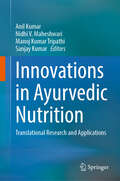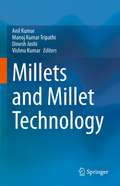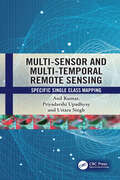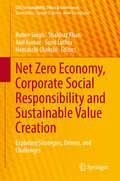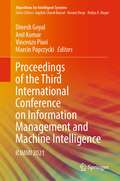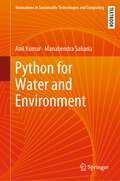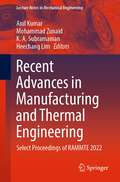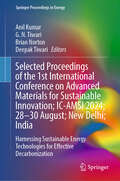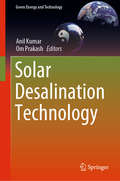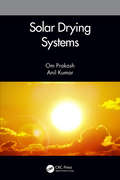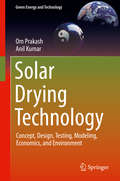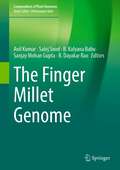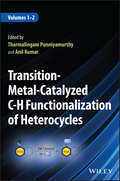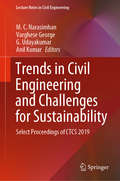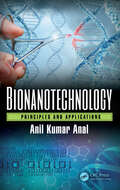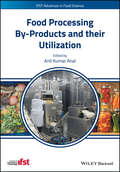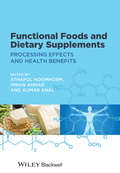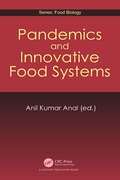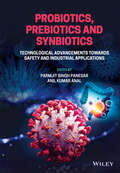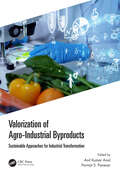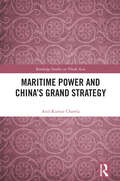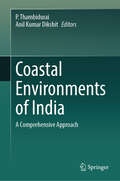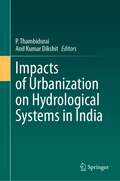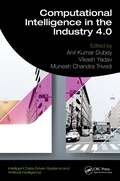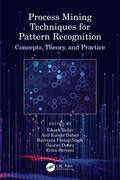- Table View
- List View
Innovations in Ayurvedic Nutrition: Translational Research and Applications
by Sanjay Kumar Anil Kumar Manoj Kumar Tripathi Nidhi V. MaheshwariThis book presents evidence-based translational research in Nutri-Ayur through the integration of traditional knowledge of Ayurveda, Genomics, and modern medicine. It aims to provide scientific evidence for the principles and concepts of Ayurveda for a predictive, personalized, and preventive approach to health and diseases. The chapter also discusses the formulation strategies of Nutri-Ayur products and associated challenges. The book also covers the role of Nutri-Ayur products in the treatment of nutritional disorders/deficiencies in children and cognition and memory dysfunction. The chapter also reviews the potential role of Nutri-Ayur products as immunomodulators and energy enhancers. The books also examine the Nutri-Ayur products that significantly possess contraceptive properties. The book also includes translational research techniques based on a systems biology approach coupled with the application of the latest technologies such as genomics, transcriptomics, proteomics, metabolomics/metabonomics, automation, and computational strategies for innovative drug design.
Millets and Millet Technology
by Anil Kumar Manoj Kumar Tripathi Dinesh Joshi Vishnu KumarMillets are small-grained, annual, warm weather cereal. The millets offer both nutritional and livelihood security of human population and fodder security of diverse livestock population in dryland region of India. Millets are highly nutritious, they are known as health foods especially for control of diabetes and mineral deficiencies. One of the major factors for declining consumption of millets is the lack of awareness of their nutritive value and inconvenience of their preparation. This book covers both, chemistry and novel technology for millet processing and development. It summarizes the latest information on millets, their nutritional and health benefits, historical perspective, utilization, R&D efforts, present status and the importance being given by policy makers for promoting millets for sustainable agriculture and healthy society. The book is compiled by various experts keeping in view syllabi of different research institutions, researchers, students as well requirement of the industry. It will serve as instructional material for researchers in food science, microbiology, process engineering, biochemistry, biotechnology and reference material for those working in industry and R & D labs.
Multi-Sensor and Multi-Temporal Remote Sensing: Specific Single Class Mapping
by Anil Kumar Priyadarshi Upadhyay Uttara SinghThis book elaborates fuzzy machine and deep learning models for single class mapping from multi-sensor, multi-temporal remote sensing images while handling mixed pixels and noise. It also covers the ways of pre-processing and spectral dimensionality reduction of temporal data. Further, it discusses the ‘individual sample as mean’ training approach to handle heterogeneity within a class. The appendix section of the book includes case studies such as mapping crop type, forest species, and stubble burnt paddy fields. Key features: Focuses on use of multi-sensor, multi-temporal data while handling spectral overlap between classes Discusses range of fuzzy/deep learning models capable to extract specific single class and separates noise Describes pre-processing while using spectral, textural, CBSI indices, and back scatter coefficient/Radar Vegetation Index (RVI) Discusses the role of training data to handle the heterogeneity within a class Supports multi-sensor and multi-temporal data processing through in-house SMIC software Includes case studies and practical applications for single class mapping This book is intended for graduate/postgraduate students, research scholars, and professionals working in environmental, geography, computer sciences, remote sensing, geoinformatics, forestry, agriculture, post-disaster, urban transition studies, and other related areas.
Net Zero Economy, Corporate Social Responsibility and Sustainable Value Creation: Exploring Strategies, Drivers, and Challenges (CSR, Sustainability, Ethics & Governance)
by Shahbaz Khan Anil Kumar Sunil Luthra Rubee Singh Hemakshi ChokshiThis edited volume brings together contributions from multiple experts in academia to explore the practical implications of the Net Zero Economy for corporate social responsibility and sustainable value creation in today's world. As the world approaches net-zero emissions by 2050, it is crucial for businesses to take corporate social responsibility seriously and make credible attempts to achieve sustainable value creation while reducing their greenhouse gas emissions. The book provides a comprehensive guide to navigating the complexities of corporate responsibility in the net-zero economy, drawing on the expertise of scholars in sustainable supply chain, environmental sciences, management, sustainable business management, and social sciences. With contributions from multiple experts, it examines the challenges that businesses face in reducing their climate impact and highlights the green growth opportunities that they can take advantage of in the net-zero transition. This edited volume is an essential read for students, research scholars, and industrial professionals working in sustainable development, eco-friendly business management, and corporate social responsibility.
Proceedings of the Third International Conference on Information Management and Machine Intelligence: ICIMMI 2021 (Algorithms for Intelligent Systems)
by Vincenzo Piuri Anil Kumar Marcin Paprzycki Dinesh GoyalThis book features selected papers presented at Third International Conference on International Conference on Information Management and Machine Intelligence (ICIMMI 2021) held at Poornima Institute of Engineering & Technology, Jaipur, Rajasthan, India during 23 – 24 December 2021. It covers a range of topics, including data analytics; AI; machine and deep learning; information management, security, processing techniques and interpretation; applications of artificial intelligence in soft computing and pattern recognition; cloud-based applications for machine learning; application of IoT in power distribution systems; as well as wireless sensor networks and adaptive wireless communication.
Python for Water and Environment (Innovations in Sustainable Technologies and Computing)
by Anil Kumar Manabendra SahariaThis textbook delves into the practical applications of surface and groundwater hydrology, as well as the environment. The Part I, "Practical Python for a Water and Environment Professional," guides readers through setting up a scientific computing environment and conducting exploratory data analysis and visualization using reproducible workflows. The Part II, "Statistical Modeling in Hydrology," covers regression models, time series analysis, and common hypothesis testing. The Part III, "Surface and Subsurface Water," illustrates the use of Python in understanding key concepts related to seepage, groundwater, and surface water flows. Lastly, the Part IV, "Environmental Applications," demonstrates the application of Python in the study of various contaminant transport phenomena.
Recent Advances in Manufacturing and Thermal Engineering: Select Proceedings of RAMMTE 2022 (Lecture Notes in Mechanical Engineering)
by Anil Kumar K. A. Subramanian Mohammad Zunaid Heechang LimThis book presents the select proceedings of the International Conference on Recent Advances in Materials, Manufacturing and Thermal Engineering (RAMMTE 2022). It broadly covers the topics of manufacturing and thermal engineering. Various topics covered in this book include alternative fuels, automation, mechatronics and robotics, CAD, CAM, FMS, CIM, CN, CFD, failure and fracture mechanics, friction, wear, tribology, and surface engineering, heat treatment, microstructure and refrigeration and cryogenics, heating ventilation and air conditioning system, heat transfer, internal combustion engines, machinability and formability of materials, mechanisms and machines, rapid manufacturing technologies and prototyping, turbo machinery, thermal engineering, and traditional and non-traditional machining processes. This book is useful for researchers and professionals working in the areas of manufacturing and thermal engineering.
Selected Proceedings of the 1st International Conference on Advanced Materials for Sustainable Innovation; IC-AMSI 2024; 28–30 August; New Delhi; India: Harnessing Sustainable Energy Technologies for Effective Decarbonization (Springer Proceedings in Energy)
by Brian Norton G. N. Tiwari Anil Kumar Deepak TiwariThis book presents peer-reviewed articles from the 1st International Conference on Advanced Materials for Sustainable Innovation (IC-AMSI 2024) held on Aug 28–30 in New Delhi, India. It delves into four key themes shaping the future of sustainable energy as follows: Emerging Technologies for Clean Energy Production: It explores the forefront of renewable energy research. Cutting-edge advancements in renewable sources, energy storage, and smart grids are unveiled, promising enhanced efficiency and sustainability in energy production. Integration of Sustainable Solutions in Energy Systems: Through meticulous analysis, it highlights the seamless incorporation of sustainable technologies into existing energy infrastructures. Emphasis is placed on optimizing energy systems to maximize their impact on decarbonization. Digitalization and Smart Energy Management: It investigates the transformative role of digital technologies, artificial intelligence, and smart energy management. This section illuminates how these innovations revolutionize energy consumption patterns, playing a pivotal role in minimizing carbon footprints. Policy and Regulatory Frameworks for Decarbonization: Readers gain insights into the evolving landscapes of policies and regulatory frameworks that underpin the deployment of sustainable energy technologies. The exploration of these frameworks creates a conducive environment for the effective implementation of decarbonization strategies. &“Innovative Pathways&” offers a multidimensional perspective, uniting technological exploration with strategic insights to guide the future of sustainable energy initiatives.
Solar Desalination Technology (Green Energy and Technology)
by Anil Kumar Om PrakashThis book presents the latest developments and advances in solar desalination technology, including the concept, design, testing, modeling, economics and innovation. The chapters in this volume are contributed by leading international researchers and are based on original research material. The contents of this volume will be of interest to researchers, professionals, and policymakers alike.
Solar Drying Systems
by Anil Kumar Om PrakashSolar energy has found its widespread use in direct conversion into electricity either by photovoltaic conversion or through thermal energy, reduction in post-harvest losses, and crop drying. Solar Drying Systems analyzes the fundamentals, principles and applications, heat transfer, elements of drying and solar dryer designs, and related modeling and analysis aspects of solar energy. Discusses both technical and policy-related issues Explores up-to-date status reviews of different solar drying systems Reviews the highlights of present and future solar drying options Includes many figures, solved examples, and tables with problems/exercises at the end of each chapter This book is aimed at senior undergraduate and graduate students in energy engineering.
Solar Drying Technology
by Anil Kumar Om PrakashThis book offers a comprehensive reference guide to the latest developments and advances in solar drying technology, covering the concept, design, testing, modeling, and economics of solar drying technologies, as well as their impact on the environment. The respective chapters are based on the latest studies conducted by reputed international researchers in the fields of solar energy and solar drying. Offering a perfect blend of research and practice explained in a simple manner, the book represents a valuable resource for researchers, students, professionals, and policymakers working in the field of solar drying and related agricultural applications.
The Finger Millet Genome (Compendium of Plant Genomes)
by B. Dayakar Rao Anil Kumar Salej Sood B. Kalyana Babu Sanjay Mohan GuptaThis book is the first comprehensive compilation of deliberations on domestication, genetic and genomic resources, breeding, genetic diversity, molecular maps & mapping of important biotic stress as well as nutritional quality traits, genome sequencing, comparative genomics, functional genomics and genetic transformation. The economic, nutritional and health benefits especially antioxidants mediated antiaging effects of finger millet are also discussed. It also presents the input use efficiency, wide adaptation, post-harvest processing and value addition of the crop. Altogether, the book contains about 300 pages over 16 chapters authored by globally reputed experts on the relevant field in this crop. This book is useful to the students, teachers and scientists in the academia and relevant private companies interested in genetics, pathology, molecular genetics and breeding, genetic engineering, structural and functional genomics and nutritional quality aspects of the crop. This book is also useful to seed and pharmaceutical industries.
Transition-Metal-Catalyzed C-H Functionalization of Heterocycles, 2 Volumes
by Anil Kumar Tharmalingam PunniyamurthyTransition-Metal-Catalyzed C-H Functionalization of Heterocycles A comprehensive guide to recent advances in this field Constituting the majority of all known compounds, heterocycles are structures that incorporate one or more heteroatoms within their core, thus exhibiting properties that are quite different from their all-carbon analogs. They are fundamental to all fields of chemistry and, therefore, their synthesis and modification has attracted a great deal of attention in the recent years. In this vein, transition-metal-catalyzed C-H bond functionalization forms a crucial tool for generating and analyzing heterocyclic compounds. Transition-Metal-Catalyzed C-H Functionalization of Heterocycles, Two-Volume Set, showcases diverse C-H functionalization methodologies and their incorporation into the latest research. The chapters serve as an essential tool depicting detailed site-selective functionalization of heterocyclic cores, along with a comprehensive discussion on their mechanistic approaches. Readers of Transition-Metal-Catalyzed C-H Functionalization of Heterocycles, Two-Volume-Set will also find: A detailed introduction to C-H activation along with the mechanistic aspects of transition-metal-catalyzed C-H bond activation reactions Easy-to-use structures with each chapter dedicated to a type of heterocycle and its specific functionalization methodologies A leading team of international authors in C-H bond functionalization Transition-Metal-Catalyzed C-H Functionalization of Heterocycles, Two-Volume-Set is a valuable guide for students and researchers in organic synthesis and process development, in both academic and industrial contexts.
Trends in Civil Engineering and Challenges for Sustainability: Select Proceedings of CTCS 2019 (Lecture Notes in Civil Engineering #99)
by Anil Kumar M. C. Narasimhan Varghese George G. UdayakumarThis book comprises selected papers from the International Conference on Civil Engineering Trends and Challenges for Sustainability (CTCS) 2019. The book presents latest research in several areas of civil engineering such as construction and structural engineering, geotechnical engineering, environmental engineering and sustainability, and geographical information systems. With a special emphasis on sustainable development, the book covers case studies and addresses key challenges in sustainability. The scope of the contents makes the book useful for students, researchers, and professionals interested in sustainable practices in civil engineering.
Bionanotechnology: Principles and Applications
by Anil Kumar AnalThis book deals with a subject of high interest and importance in all sectors, including biomedical, food, agriculture, energy, and environment. Biological systems are essential in nanotechnology, and many new applications are being developed by mimicking the natural systems. Approaching these topics from an engineering perspective, the book offers insight on the details of nanoscale fabrication processes as well as cell biology. The basics of biology and chemistry, with a focus on how to engineer the behavior of molecules at the nanoscale, are also explored and analyzed. The aim of the text is to provide the reader with broader knowledge of biological methods for signal transduction and molecular recognitions systems and how they can be replicated in bio-sensing applications. The reader will learn the basic structures and interactions of biomacromolecules for developing biocompatible and eco-friendly devices.
Food Processing By-Products and their Utilization (IFST Advances in Food Science)
by Anil Kumar AnalFood Processing By-Products and their Utilization An in-depth look at the economic and environmental benefits that food companies can achieve—and the challenges and opportunities they may face—by utilizing food processing by-products Food Processing By-Products and their Utilization is the first book dedicated to food processing by-products and their utilization in a broad spectrum. It provides a comprehensive overview on food processing by-products and their utilization as source of novel functional ingredients. It discusses food groups, including cereals, pulses, fruits, vegetables, meat, dairy, marine, sugarcane, winery, and plantation by-products; addresses processing challenges relevant to food by-products; and delivers insight into the current state of art and emerging technologies to extract valuable phytochemicals from food processing by-products. Food Processing By-Products and their Utilization offers in-depth chapter coverage of fruit processing by-products; the application of food by-products in medical and pharmaceutical industries; prebiotics and dietary fibers from food processing by-products; bioactive compounds and their health effects from honey processing industries; advances in milk fractionation for value addition; seafood by-products in applications of biomedicine and cosmeticuals; food industry by-products as nutrient replacements in aquaculture diets and agricultural crops; regulatory and legislative issues for food waste utilization; and much more. The first reference text to bring together essential information on the processing technology and incorporation of by-products into various food applications Concentrates on the challenges and opportunities for utilizing by-products, including many novel and potential uses for the by-products and waste materials generated by food processing Focuses on the nutritional composition and biochemistry of by-products, which are key to establishing their functional health benefits as foods Part of the "IFST Advances in Food Science" series, co-published with the Institute of Food Science and Technology (UK) This bookserves as a comprehensive reference for students, educators, researchers, food processors, and industry personnel looking for up-to-date insight into the field. Additionally, the covered range of techniques for by-product utilization will provide engineers and scientists working in the food industry with a valuable resource for their work.
Functional Foods and Dietary Supplements: Processing Effects and Health Benefits
by Imran Ahmad Athapol Noomhorm Anil Kumar AnalFunctional foods are foods which contain bioactive components, either from plant or animal sources, which can have health benefits for the consumer over and above their nutritional value. Foods which have antioxidant or cancer-combating components are in high demand from health conscious consumers: much has been made of the health-giving qualities of fruits and vegetables in particular. Conversely, foods which have been processed are suffering an image crisis, with many consumers indiscriminately assuming that any kind of processing robs food of its “natural goodness”. To date, there has been little examination of the actual effects – whether positive or negative – of various types of food processing upon functional foods. This book highlights the effects of food processing on the active ingredients of a wide range of functional food materials, with a particular focus on foods of Asian origin. Asian foods, particularly herbs, are becoming increasingly accepted and demanded globally, with many Western consumers starting to recognize and seek out their health-giving properties. This book focuses on the extraction of ingredients which from materials which in the West are seen as “alternative” - such as flour from soybeans instead of wheat, or bran and starch from rice – but which have long histories in Asian cultures. It also highlight the incorporation of those bioactive compounds in foods and the enhancement of their bioavailability. Functional Foods and Dietary Supplements: Processing Effects and Health Benefits will be required reading for those working in companies, research institutions and universities that are active in the areas of food processing and agri-food environment. Food scientists and engineers will value the new data and research findings contained in the book, while environmentalists, food regulatory agencies and other food industry personnel involved in functional food production or development will find it a very useful source of information.
Pandemics and Innovative Food Systems (Food Biology Series)
by Anil Kumar AnalThe debate on health, nutrition and food security could not have arisen at a more opportune time. The recent pandemic has given rise to increased food and nutrition insecurity for individuals, families, and communities. The crisis threatened the food security and nutrition of millions of people, many of whom were already suffering. We face possible disruptions to the functioning of food systems, with severe consequences for health and nutrition. Pandemics create a greater burden for poorer countries and countries since they are already pressure of inadequate food supplies. With concerted action, we can not only avoid some of the worst impacts but do so in a way that supports a transition to more sustainable food systems that are in better balance with nature and that support healthy diets – and thus better health prospects for all. This book aims to highlight the impact of pandemics in food systems and nutrition security. It draws on the experience from the past and present pandemics to better prepare the world for future crises.
Probiotics, Prebiotics and Synbiotics: Technological Advancements Towards Safety and Industrial Applications
by Anil Kumar Anal Parmjit Singh PanesarIn Probiotics, Prebiotics and Synbiotics: Technological Advancements Towards Safety and Industrial Applications, a team of distinguished researchers delivers an insightful exploration of various aspects of functional foods. The book includes information about critical facets of the production of these beneficial compounds, recent technological developments in the field, and their present and future commercial potential. The authors describe their mechanisms of action and their applications in several sectors. Probiotics, Prebiotics and Synbiotics is divided into five parts. A general introduction about these substances begins the book and is followed by discussions of common probiotics, prebiotics, and synbiotics. Finally, a treatment of safety issues and regulatory claims, as well as their market potential, rounds out the resource. Perfect for researchers, industry practitioners, and students working in or studying food processing and food microbiology, Probiotics, Prebiotics and Synbiotics is also an invaluable resource for professionals working in the field of food biotechnology.
Valorization of Agro-Industrial Byproducts: Sustainable Approaches for Industrial Transformation
by Anil Kumar Anal and Parmjit S. PanesarThis book covers sustainable approaches for industrial transformation pertaining to valorization of agro-industrial byproducts. Divided into four sections, it starts with information about the agro/food industry and its byproducts, including their characterization, followed by different green technologies (principle, process strategies and extraction of bioactive compounds) applied for the management of agro industry byproducts. It further explains biotechnological interventions involved in the value addition of these byproducts. Various regulatory and environmental concerns related to by-product management along with biorefinery concept and future strategies are provided as well. Features: Provides extensive coverage of agro-industrial by products and their environmental impact. Details production of value-added products from agro-industrial waste. Describes environmental legislations and future strategies. Presents multidisciplinary approaches from fundamental to applied and addresses the biorefinery and circular economy. Includes innovative approaches and future strategies for management of agro-industrial waste. This book is aimed at researchers, graduate students and professionals in food science/food engineering, bioprocessing/biofuels/bioproducts/biochemicals and agriculture, bioeconomy, food waste processing, post-harvest processing, and waste management.
Maritime Power and China's Grand Strategy (Routledge Studies on Think Asia)
by Anil Kumar ChawlaThis book examines the role of maritime power in the ‘Chinese Dream’ of becoming the pre-eminent global power by 2049, a century after the establishment of the People’s Republic of China (PRC). The book argues that China seeks to use its maritime power as part of its quest to attain Great Power status by employing it to these areas: provide deterrence in the maritime domain; assure availability of resources; protecting its sea lines of communication; and in the economic domination of specific developing countries in Asia, Africa, Oceania and South America. Based on a careful examination of primary sources, especially China’s defence white papers and essential works on the topic by prominent Chinese military analysts and institutions, the author systematically unpacks interpretations and analysis of China’s evolving concepts of maritime power. The book traces China’s development and use of maritime power over its long-recorded history, especially from the time it became the People’s Republic of China (1950) to the present (2024) and links the country's maritime past with the present. A comprehensive and detailed study of the evolution of Chinese concepts of maritime power and how it forms an important part of the rejuvenation of the nation and the projection of China as a global power by mid-century, this book will be of interest to researchers studying Asian and Chinese Studies, Military Studies and policy makers at think tanks and government agencies.
Coastal Environments of India: A Comprehensive Approach
by Anil Kumar Dikshit P. ThambiduraiCoastal environments are unique and highly dynamic ecosystems that play a vital role in climate regulation, support biodiversity, and highly impact human activities. This book deals with a combination of specialized areas in multiple fields. It covers the coastal ecosystem of marine life and its importance for biodiversity conservation. Sincerely addressing significant coastal dynamics, including coastal erosion and sedimentation on the shorelines. Natural hazards that caused widespread damage all along the coastal habitation on a global scale. Further, it evaluates the effects of human activities on coastal development, pollution, and predation on marine ecosystems, besides adding notorious human-induced pollution, which is of great environmental concern now. Importantly, this combination of specializing within an area of multiple fields leads to a broad range of research issues. This book offers numerous components of study to create a comprehensive guide for future prospects.
Impacts of Urbanization on Hydrological Systems in India
by Anil Kumar Dikshit P. ThambiduraiThis book documents the various impacts of urbanization on hydrological systems and water resources. The first half of the book is focused on urbanization and surface waters, starting with the status of hydrological systems in the urban areas, i.e. the catchment characteristics and changes in rainfall dynamics. The most pronounced hydrological problems in cities are changes in runoff due to precipitation. Recently, rain events have been less frequent but more intense, sometimes leading to flash floods. Though the substantial increase in runoff causes floods in the urbanized area, it may be attributed to the reduction of infiltration due to construction of roads. This, in turn, results in groundwater decline and depletion. The second half of the book covers the impact of urbanization on groundwater, which starts with hindered or significantly reduced recharge taking place due to altered urban surfaces. The limited groundwater resources are over-exploited by the urban population, leading to water scarcity and depletion. Groundwater gets polluted due to solid waste dumping sites or by wastewaters discharged by industries. The book will be useful for researchers, educators, municipal/city authorities, government officials, and NGOs.
Computational Intelligence in the Industry 4.0 (Intelligent Data-Driven Systems and Artificial Intelligence)
by Anil Kumar Dubey Vikash Yadav Munesh Chandra TrivediThis book discusses the importance of using industrial intelligence in collaboration with computational intelligence in forming a smart system for diverse applications. It further illustrates the challenges and deployment issues in industrial resolution. The text highlights innovation and applications of computational agents and the industrial intelligence era to automate the requirements as per Industry 4.0.This book: Discusses computational agents for handling automation issues and the role of ethics in industrial resolution Presents intelligence approaches for products, operations, systems, and services Illustrates the fundamentals of computational intelligence to forecast and analyze the requirements of society for automation as well as recent innovations and applications Highlights computation intelligence approaches in reducing human effort and automating the analysis of the production unit Showcases current innovation and applications of computational agents and industrial intelligence as per Industry 4.0 The text is primarily written for senior undergraduate and graduate students, and academic researchers in diverse fields including electrical engineering, electronics, and communication engineering, industrial engineering, manufacturing engineering and computer science, and engineering.
Process Mining Techniques for Pattern Recognition: Concepts, Theory, and Practice
by Anil Kumar Dubey Vikash Yadav Erma Suryani Harivans Pratap Singh Gaurav DubeyThis book focuses on the theory, practice, and concepts of process mining techniques in detail, especially pattern recognition in diverse society, science, medicine, engineering, and business. The book deliberates several perspectives on process mining techniques in the broader context of data science and big data approaches. Process Mining Techniques for Pattern Recognition: Concepts, Theory, and Practice provides an introduction to process mining techniques and pattern recognition. After that, it delivers the fundamentals of process modelling and mining essential to comprehend the book. The text emphasizes discovery as an important process mining task and includes case studies as well as real-life examples to guide users in successfully applying process mining techniques for pattern recognition in practice. Intended to be an introduction to process mining and pattern recognition for students, academics, and practitioners, this book is perfect for those who want to learn the basics, and also gain an understanding of the concepts on a deeper level.
